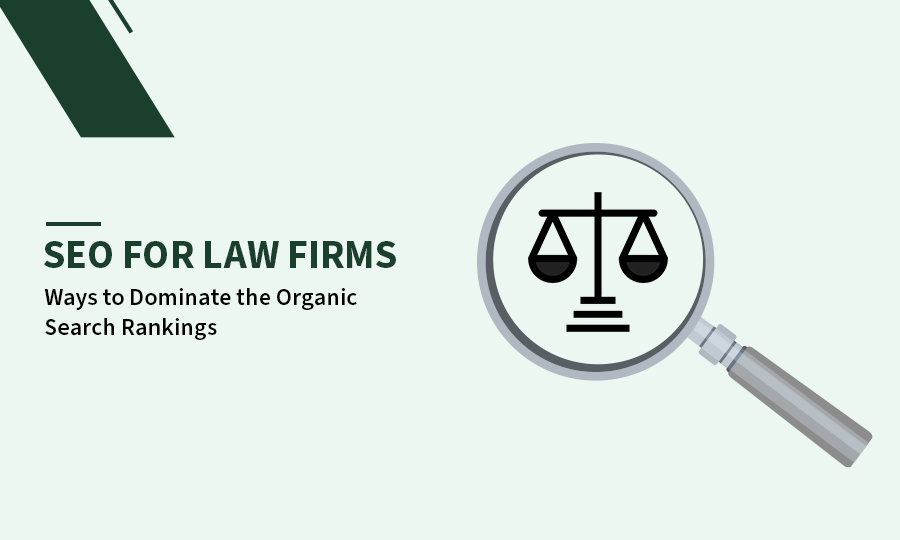Prioritizing SEO for law firms should be one of your key marketing strategies if you care to keep the billable hours rolling. As a law firm owner, even if you have the best battery of lawyers, not getting enough clients can lead to a business wind-up.
Before proceeding, answer one question. While searching for any service, how many times have you tapped on page two to find it? Page three? Page ten?
Never.
Hence, in today’s age, a solid digital presence is mandatory. Your search engine rankings decide the volume of organic footfall your website receives. It is perhaps one of the best online lead-generation strategies for boosting organic traffic.
As Google’s approach continues to be customer-centric, crafting superior web content is essential. But stopping at on-page SEO efforts won’t cut the competition. You have to gear up your website with off-page and technical SEO efforts as well for charting up on the search engine results pages.
What is SEO for Lawyers & Law Firms?

Attorney search engine optimization implies a section of digital marketing efforts boosts the organic search engine ranking of the legal web pages. It entails keyword research, web content writing, link building, URL structuring, load speed optimization, mobile optimization, and more.
As a lawyer’s services can impact a person’s life, this is why your website is categorized under the YMYL category. Because of this, you have to keep ethical considerations in mind while optimizing content for the website.
You can stick to the basic strategies if you wish to— no harm in that. But in this case, we can assure you that you won’t be near the SERPs’ first page.
For better search results, you must keep and optimize the website’s micro SEO elements.
Let us discuss the Google ranking factors in detail. Keeping these factors in mind while optimizing SEO for your law firms can garner immensely positive results.
Importance of Law Firm SEO

Legal SEO is critical to any law firm as it can generate an immense number of clients by boosting ranks. However you have to ensure that the landing pages are relevant.
Given the fact that about 1/3 of people who need legal services search online before visiting them, hardwiring your website with a solid SEO strategy isn’t the worst idea.
When your web page ranks at the top, it gets the advantage of coming off as an authoritative source. In fact, in recent years, the 1st page gets a whopping CTR of 71.33% (As per MOZ)!
According to Forbes, the 2nd page of Google search results gets a collective of 6% of total clicks. The figures are indicative of the bizarre traffic percentage for the third and the pages beyond receives.
With the inclusion of RankBrain into the core algorithm of Google, user behavior patterns also affect SEO.
If you are a lawyer, freshly minted out of law school, skipping search engine optimization isn’t an option. To match pace with the other attorneys of this generation who would give up an arm and a leg to have a thriving clientele, you absolutely NEED legal SEO.
To improve your rankings, take note of the top Google ranking factors. Delivering quality in these domains can prove to be immensely beneficial to boost the footfall of organic traffic.
Let’s take a look.
Top 4 Ranking Factors That Can Make or Break Your Search Rankings
SEO is powerful. A solid law firm SEO campaign can take your law practice out of the pit and help it reach for the stars.
Google algorithm is a puzzle that no one can solve. However, according to SEO experts, there are four primary ranking factors in these games.
Let’s discuss the Google ranking factors to help your law firm website rank higher;
SEO Ranking Factor #1: Impeccable Content Quality
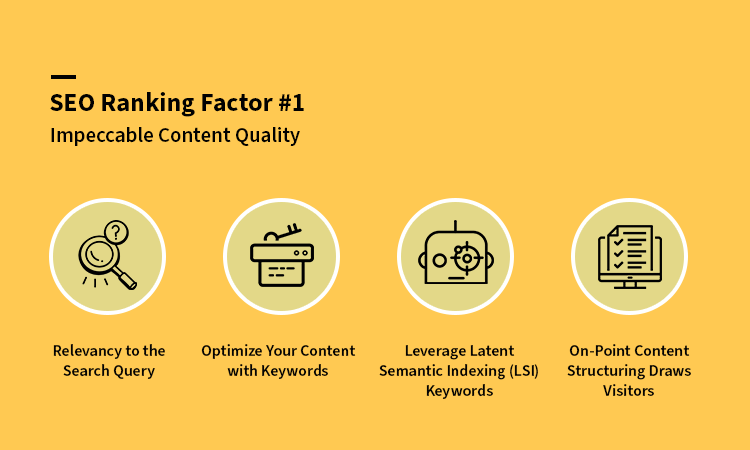
High quality content has no alternative. It can MAKE or BREAK your law firm’s SEO efforts!
In fact, according to the recent update, ‘good website content’ is the #1 ranking factor.
Google ranking results have become highly user-oriented and center around sending back the most relevant results for every search query.
Your profession is all about brains and talks! Hence, keeping your content informative yet precise will fetch you marks in the SEO game, whereas beating around the bush can be detrimental.
This does not imply bombarding visitors with legal jargon. Keep the language simple yet crisp to make it an interesting read.
Legal website content should primarily have the infusion of 3 key elements;
1. Relevancy to the Search Query
With the recent inclusion of RankBrain in Google’s core algorithm, relevancy to the main search query is vital.
For instance, if you want your website to appear as ”Best law firms in a location,” you must optimize your website content according to this particular keyword and location.
Some possible keywords combinations for this search query are ‘Top law firm in the location,’ ‘Best lawyer in location,” ‘ Best lawyer near me’, ‘best criminal defense lawyer in location, etc. Yes, local SEO is super vital for law firms, but we will get to that later!
The key to a good ranking is to put your feet into the potential client’s shoes. Consider what they could think while looking for legal services in your area.
- Is this law firm located near me?
- What services does this law firm offer?
- What are the charges for the legal services?
- Do they offer consultation in other states?
- Is this legal service any good?
The content on the landing pages should answer all potential queries a visitor might have.
It is crucial because Google’s user-centric approach focuses on offering visitors the best web experience.
If Google identifies your law firm’s website as worthy, it will send visitors to your page. Then it observes the user behaviour pattern.
If your website receives a high click-through rate and on-page time, your ranking on the search engine results pages will be sustained.
In case the bounce rate is higher, you can kiss goodbye to your ranking!!
Being relevant and delivering what your website promised to the visitors is pivotal part of organic ranking.
3. Optimize Your Content with Keywords
Optimizing your content with keywords helps the search engines understand what a particular page is about. Keyword optimization remains one of the most fundamental aspects of SEO success to date.
Answering your prospective client’s questions on the website is important. When a reader reads a well-written legal article by you, they would appreciate it. However, Google, Bing, or Yahoo scrolls through websites using web crawlers or bots.
When these bots scurry through the content send them signals when they find relevant keywords on your website.
Keyword placement is crucial for your law firm’s search engine rankings. Your content should have the target keywords preferably in the following places:
- The first paragraph of your content
- In the title tags
- The target keyword should be present in the heading tag
- Place the keyword at least once in every 300 words
- The keyword should be spread evenly throughout the content
- Keywords should be present in the meta description and URL
Practically speaking, SEO or law firms cannot be complete without optimizing the local SEO. It is best to target a few local keywords to get better local search results.
3. Leverage Latent Semantic Indexing (LSI) Keywords
LSI keywords provide value to your SEO strategy when baked into the content.
A prospective client searching for the best legal firm in Denver can also search for the best civil lawyer near them or affordable law firm services in Denver. Hence, you have to choose the most relevant keyword set that your target audience would likely search.
Use LSI keywords in your content to touch all the bases. These are words related to your main keywords that offer richness to the content.
It is important to use LSI keywords along with the main one because different people tend to search for the same thing using varied language patterns.
Some use simple sentences or words; others use full sentences to search for law firms. Hence, search engine optimization for law firms should incorporate these secondary keywords into the mix for sustained results.
Where can you use LSI keywords?
Well, you can add these keywords to the following places;
- The same place where you use the primary keyword
- Use LSI keywords in the image alt tags
- In the heading tags
- Use legal LSI keywords in the meta descriptions
- Spread them throughout the content body
Repeating the same main keyword throughout the content might seem monotonous and spammy. Using related terms for legal website content breaks the monotony and makes for an interesting read.
4. Impeccable Content Structuring Draws Visitors
The content structure of your legal website should be precise and on point. It should deliver information in a matter-of-fact manner!
Your website content should be lucid, readable, and easy to understand. Throwing bombastic legal jargon can cause readers to fly off of your website.
You are dealing with humans who are seeking legal services. Prospective clients are looking for lawyers who are empathetic and knowledgeable at the same time.
Use title tags and H tags to break up the content into smaller parts for easier understanding.
Here’s how to write a precise legal webpage that brings in visitors and helps in lead conversion:
- Use shorter sentences to write web content
- Legal content should have a professional tonality
- Keep the paragraphs shorter
- User H tags to break the structure into smaller parts for easier understanding
- Leverage internal and external linking
- Use images to expand the attention span of readers
Search engines think structured content to be a valuable source of information that readers would take an interest in.
However, while crafting content prepared for your legal website, ensure that it is written in a lucid style with enough illustrations and infographics to increase the on-page time.
Also, make use of alt texts. These texts help the web spiders decode what any particular image is about.
SEO Ranking Factor #2: Solid Backlink Portfolio
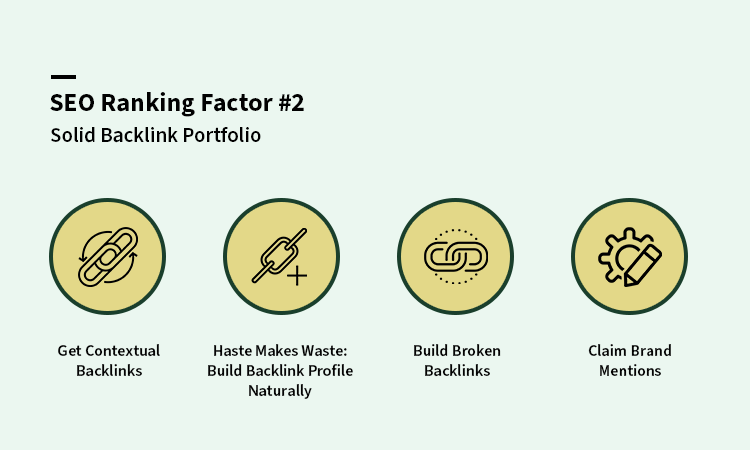
A backlink is generated when another website links back to your website in their website. It boosts the domain authority and sends E-E-A-Ts signals to the search engines.
However, building a robust backlink portfolio takes time.
Literally speaking, Google occupies 91.61% of the search engine market. Hence, appeasing Google requires some heavy tasks in terms of SEO optimization for your legal firm!
We shall discuss all. Let’s have a look at three of the most important aspects of backlink building that matter in SEO success.
1. Get Contextual Backlinks
When it comes to backlinks, Google has strict guidelines. It is about both quality and quantity.
A solid law firm SEO strategy while building a backlink portfolio is to remain focused on the niche. Acquiring irrelevant backlinks can hardly give you the boost in the domain authority you are looking for.
As an attorney, adding links that are relevant to the legal field adds positively to the SEO efforts.
When your domain links back to several high-authority sources and is backed by high quality content, Google deems your domain worthy enough and boosts its rankings.
Try building the backlink portfolio naturally. If that doesn’t work, you can outreach to other high-authority websites.
However, if you think that you are facing a break-neck competition and you want to save some time, you can fall back on professional link building agencies that follow ethical practices for building your backlink portfolio.
2. Build Broken backlinks
Broken links contribute negatively to user experience. More than that, it is hurtful to your search engine rankings, which can cause a dip in organic website traffic.
When a user clicks on a link that leads them to Error 404, it is defined as a waste of their time. And Google does not see it in a kind light!
As the backlink profile is one of the top ranking factors for law firms websites, ensuring that every link is active. If a link is broken, take measures to fix it at the earliest.
Craft a fresh post and approach the website owner to reconnect it to a fresh link.
3. Claim Brand Mentions
Brand mentions are potential backlinks that are waiting to be claimed.
Scour the internet and check whether any website or client review contains the name of your law firm.
When you find a mention that is worth adding to the backlink portfolio, approach the owner of the website or individual who mentioned you and request them to place a link to your website.
These are natural links that can buff up your backlink portfolio. These links help your website to come off as a trustworthy source for knowledge or legal services.
SEO Ranking Factor #3: Technical SEO Optimization
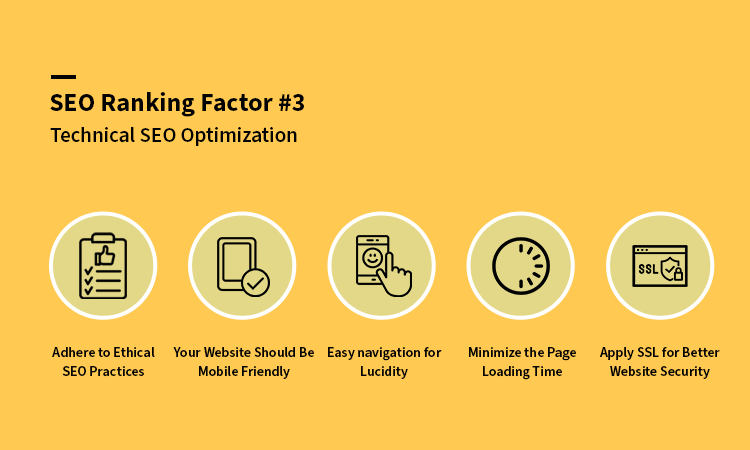
Technical SEO for law firms entails mobile optimization, load speed optimization, better navigation, upgrading user experience, ensuring website security, etc.
It is not enough to create a snazzy law firm website design; it should have interactive icons, be to the point, and be easy to navigate.
Technical optimization is the simplest if you know the ropes. However, it can be the trickiest to get right, especially if you are no Technical SEO expert.
Check your website’s technical optimization level. If you find any loops, you can avail the help of a law firm SEO agency.
Let’s take a peek at the individual elements of technical search engine optimization that can cast a limelight on your legal firm in the online domain.
1. Create a Mobile Friendly Law Firm Website
Google prioritizes mobile-first indexing over desktop-first indexing. It means that the search engine uses the mobile version of your website for indexing.
Hence, focusing on mobile optimization & mobile responsiveness should be the first thing on your mind.
According to Forbes, mobile traffic can be as high as 57%. Hence, for a seamless user experience for your potential clients, working on mobile responsiveness is imperative.
To boost up the SEO for lawyers, you must;
- Change button size and placement
- Minimize images to suit smaller screens
- Format content to suit mobile viewing
- Write shorter paragraphs and sentences
2. Easy navigation for Lucidity
The website structure should be easy to navigate for the visitors as it is one of the key ranking factors for websites.
Not everyone who visits your legal website is well adept at internet surfing. Many of the visitors are old school and only use the internet to search for the best lawyer near them. You have to keep the target traffic in mind while creating the website structure.
Your law firm’s website should be simple enough for anyone to navigate. The users should be able to reach from one page to another.
Try building a responsive website with a sidebar that caters to smooth navigation and excellent user experience for top-legal SEO.
3. Minimize the Page Loading Time
Aim for a loading time under 2.5 seconds. Anything above that can have a negative effect on your law firm’s SEO efforts. It is harmful to your ranking as a high page loading time does not offer a good user experience in general.
As the page loading time increases, so does the bounce rate. The user behavior pattern can point towards a negative signal that can be detrimental to your law firm’s SEO campaign.
To optimize page speed time, you must;
- Compress website images and videos
- Limit the number of HTTPS request
- Use HTTP caching on your law firm website
4. Apply SSL for Better Website Security
For better search engine optimization, boost your website security. An SSL (secure sockets layer) certificate authenticates your website’s security and ensures the users of better-encrypted transactions of words or payments.
As it boosts credibility, such websites earn the confidence of visitors and search engines alike. An SLL certification affects the site’s performance positively. It bolsters client conversions and reduces bounce rates.
Other benefits that an SSL certification can have for your legal SEO campaign are;
- Protect sensitive information
- Phishing attacks prevention
- Increase the trust of potential clients
- Regulatory compliance boosts online visibility
SEO Ranking factor #4: RankBrain
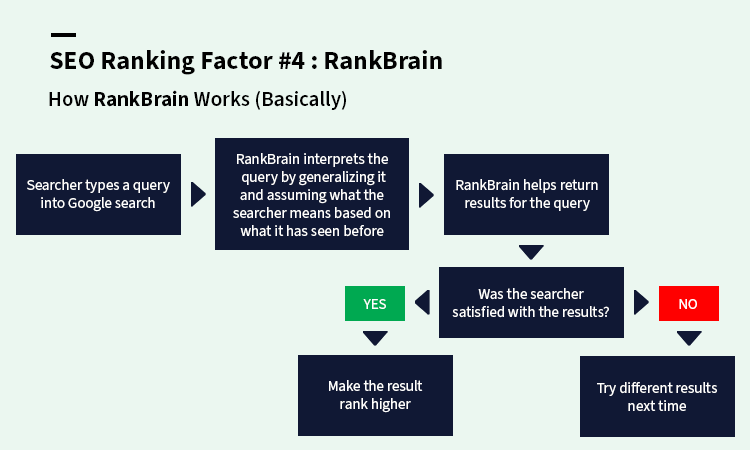
RanBrain is the name of Google AI that is dedicated to understanding search queries and the user intent behind them. According to Google, RankBrain is now the third most important ranking factor!
This machine learning artificial intelligence studies the search queries of the users and returns the most relevant search results. Then RankBrain the visitor behavior pattern, and based on it, this algorithm maintains or alters the search results.
Suppose your law firm website ranks on the #1 page of the SERPs, and it receives a somewhat negative user behavior pattern, Google will pull down your rank.
What are the signals RankBrain registers for search engine ranking?
- Popularity of your website
- Natural language pattern (NLP) of content
- Organic traffic volume on your webpage
- On-page time and bounce rates
1. Never Skip Local SEO for Lawyers & Law Firms
As an attorney, you must rely mostly on local clients to earn your bread and butter. Hence, it is best to focus on Local SEO for your law firm’s website.
Optimizing local SEO boosts the online visibility of your legal website to the people in your surrounding area.
Suppose you are a personal injury lawyer or a criminal defense lawyer in Vermont; how will people in the nearby areas know the services you offer?
You possibly cannot go from door to door distributing pamphlets. This is where local SEO for attorneys comes into play!
We would go so far as to say it is perhaps the most potent weapon at your disposal to etch your name in the legal industry.
Let’s walk you through the perquisites of local SEO to form a terrific law firm’s SEO strategy;
2. Claim Your Google Business Profile to Ward Off Competition
Although the industry is packed with the who’s who of legal businesses, you can give them a run for their money simply by enlisting your law practice in the Google Business Profile.
This is because 56% of businesses aren’t even registered on Google My Business. All it takes is a few simple steps to claim your business profile. Claiming GBP gives you a sharp edge over others.
We have talked about GBP in the local SEO for lawyers’ section. However, as it is so vital, we thought of dedicating a section to it.
Begin by claiming your GMB listing if you haven’t already. This involves verifying your law firm’s information, i.e., business NAP and office hours. Google uses this data to ensure accurate and consistent representation in local search results.
In the category section, choose the primary category. In your case, you would choose ”lawyer” or ”law firm”, whichever is relevant. The GBP lets you choose 8 sub-categories as well.
Another way to leverage Google Business profile is to collect positive reviews. Research says most clients will leave a positive review on your profile on Google when you ask them.
Don’t skip updating your profile with updated information about your business in case there’s a change in business hours, contact number, address, etc.
Also, monitoring and management of your GMB profile ensures accurate representation of your legal practice. It helps bolster your local SEO strategy and helps you stand out to potential clients in local searches.
How to Leverage GMB for SEO Traction?
- Claim your GMB profile on Google
- Add the right category and the sub-categories of your legal business
- Update the GMP profile with updated information about your practice
- Ask clients to leave positive reviews
- Update business information as and when necessary
3. Enlist in Local Directories
Enlisting in local directories is an off-page SEO strategy for lawyers and law firms. In the time of social media, many attorneys skip it. However, this underestimated SEO strategy can send the footfall of organic traffic through the roof!
Local people can be the best hot leads for your law firm websites.
HOW?
You see, the law differs from one state to another. Suppose you are a lawyer in California, adept at the law of the state. Clients who approach you from New York might be in the middle of a legal issue that you aren’t well acquainted with as far as the state law is concerned.
Hence, getting clients from your own state, specifically from your area, puts you in your comfort zone.
Remember this: You should leverage local directories like Yelp or MapQuest.
Research says 68% of people will only stop doing business if they find correct information online. Provide accurate and consistent business information. It includes your law firm’s name, address, phone number, and business hours. Also, Google considers this data when determining local search rankings.
How to Register in Local Directories?
- Claim your GBP profile
- Open the website of local directories
- pay a small fee (if necessary) and register
- Ensure to maintain consistent information across all platforms
- Update the directories in case business information changes
4. Local Link Building
Google considers the backlink portfolio as one of the major ranking factors. However, acquiring links from high-authority domains is not enough to rank in the local searches. The goal is to establish your website as a trusted source in the local domain.
Hence, you must infuse various high-authority LOCAL links into your backlink portfolio to establish yourself as an authoritative source among the existing local competition.
This means you have to target websites that are from your locality. As a lawyer, it is preferable if you target other law firm websites or legal education sites that are based locally.
Local Link Building Checklist
- Find high authority local websites
- Approach webmasters
- Find local keywords/ dialect words
- Craft guest posts using local keywords
- Post in on the host’s site and acquire the link
SEO DIY vs Legal SEO Services: Which is better?
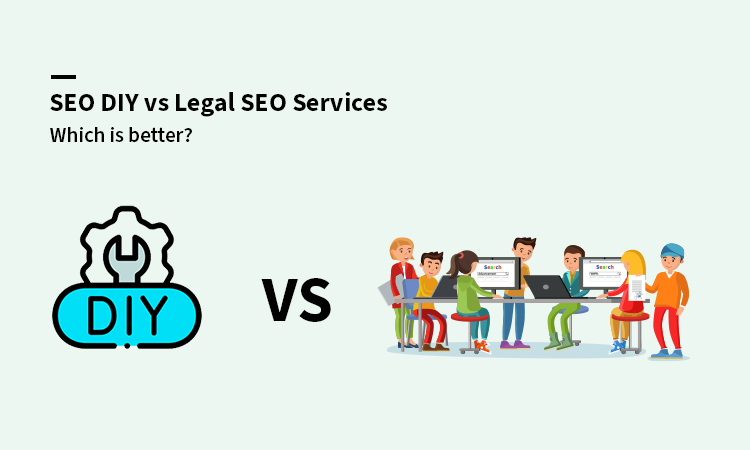
If you want to dominate the search engine results with a solid lawyer SEO, there are two ways to do it.
Do-it-Yourself #1
The first is to do it yourself. Optimizing your own website for organic search can empower you with knowledge of the various nuances of SEO. If you already hold knowledge of lawyer SEO, the DIY can be a terrific option.
Optimizing your own website is a great way of cutting costs. However, before you take up the gigantic project of devising an SEO marketing strategy, we thought it important to bring forth certain limitations that you might incur on this path.
Limitations of Optimizing SEO By Yourself
- SEO for law firms can take quite some time as this is not your field of expertise
- It is not a one-time activity. You have to be constantly involved
- It will cut into your time for law practice
- You have to constantly learn about Google’s algorithmic changes and adapt to the SEO tactics
Hire Legal SEO Services #2
While it can take a small out of your profit, entrusting the job to a law firm SEO company can be beneficial in more than one way. The attorney SEO agencies have experts who can deliver quicker results with the help of ethical practices.
SEO agencies have a team that monitors the Google search console and tracks Google Analytics for campaign monitoring. They can tailor SEO strategies and tweak the campaign to keep up with the SEO trends. With their help, reaching your target audience can be a piece of cake!
They can deliver better ROI in a stipulated time frame.
While these services can bestow your website with the top search engine rankings, this process, too, has a few limitations.
Limitations of Hiring a Professional
- Searching for a good SEO company can be a challenge
- It can cut into your profit
- Tailoring an exclusive SEO strategy is not always that easy
FAQs
Search engine optimization for law firms cost between $250 to $1500 per month. The price can vary depending on the SEO company and the task load. It is best not to settle for SEO solely because they cost less. Always compare the quality of their work with the price they are charging before coming to any conclusion.
Most law firms make the mistake of skipping law firm SEO altogether. Or they pay little attention at best. Other mistakes that law firms make are;
1. Not crafting expert legal content
2. Skipping claiming their Google My Business profile
3. Inconsistent NAP mentions
4. Making haste in backlink acquisition
5. Not creating a mobile-optimized website design
Lawyer SEO is more of a traditional approach towards digital marketing. It gives you sustainable results when done right. However, it takes a while to get the fruits of your efforts when it concerns SEO. You can try alternate methods like social media marketing for lawyers to get more referral traffic to your website. You can try paid methods like Google Ads and Bing Ads if you want immediate online visibility.
Wrapping Up
SEO for lawyers and law firms can be a tricky business. As legal services impact people’s lives, your website content falls under the YMYL category. Hence, you require impeccable content to show up high on the organic search results.
Other ranking factors include having a robust backlink portfolio, RankBrain, technical optimization, and Local SEO.
Optimizing legal SEO can be tricky; you can hire a professional law firm SEO company if you have a sparable budget for marketing. Don’t worry. You will often recover what you invest with the leads your website generates. You can also optimize SEO if you have the time and the resources.
Additional Resources

